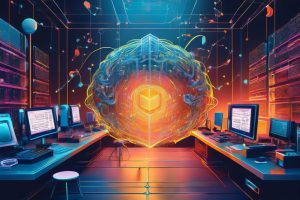
A team led by Somdatta Goswami, an assistant professor in the Whiting School of Engineering’s Department of Civil and Systems Engineering, has received a National Science Foundation (NSF) grant to make AI tools more accessible to engineers. The Early-concept Grant for Exploratory Research (EAGER) is part of NSF’s National Artificial Intelligence Research Resource (NAIRR) Pilot program, which aims to ensure the U.S. is a leader in AI innovation and security by democratizing access to critical data and computing resources.
Goswami’s project aims to overcome current limitations in the use of AI for engineering research by accelerating exascale multiphysics simulations, which can perform a quintillion (billion-billion) calculations per second, and are essential in modeling for a variety of engineering fields. However, they are costly to conduct, often forcing researchers to limit experimental parameters and sometimes leading to suboptimal designs.
“Our innovative AI system combines traditional simulation techniques with machine learning. The AI system is trained using numerous small-scale past simulations, allowing the system to recognize familiar portions of new, larger simulations. In these familiar areas, the AI rapidly generates solutions, while more detailed traditional simulation methods are applied to new or highly complex portions,” Goswami said.
This adaptive approach maintains high solution accuracy while dramatically accelerating the overall computational speed from months to mere minutes. Using the new system, researchers across various scientific and engineering fields, from climate modeling to advanced materials design, will be able to explore a vast range of parameters more efficiently.
“In science and engineering, we often need to test many different combinations of factors to find the best solution. It’s like trying to find the perfect recipe by adjusting ingredients and cooking times,” said Goswami. “Usually, we can only test a few combinations because it’s too time-consuming and expensive to try them all. By combining traditional methods with AI, we can now explore a much wider range of possibilities, giving us a better chance of finding the optimal solution.”
Conducted in collaboration with Krishna Kumar, assistant professor at the University of Texas at Austin, and with support by the Texas Advanced Computing Center, Goswami’s team’s project will also include STEM outreach to children and teams aimed at cultivating the next generation of diverse STEM talent. The entire effort aligns with national priorities to maintain U.S. leadership in Artificial Intelligence.